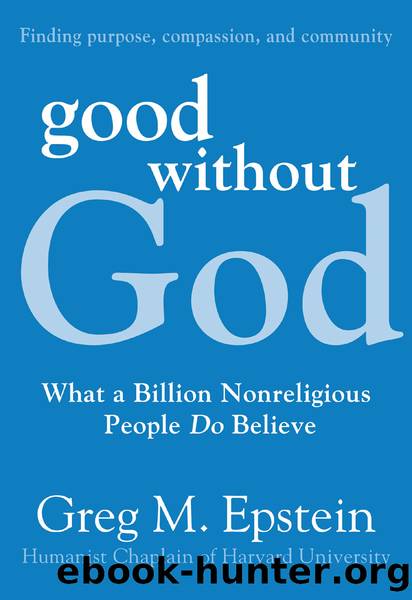Good Without God: What a Billion Nonreligious People Do Believe by Greg Epstein

Author:Greg Epstein [Epstein, Greg]
Language: eng
Format: epub
Tags: Faith, Non-Fiction, Religion, Spirituality
ISBN: 9780061670121
Google: lizAK72dCUMC
Amazon: B002SR2Q9G
Publisher: HarperCollins
Published: 2009-10-12T23:00:00+00:00
Beyond the Golden Rule: Rules, Regulations, and Suggestions
One of the defining elements of almost every major religion is a set of moral rules, regulations, and suggestions. Judaism has Halacha, an evolving and ever-expanding set of laws that regulate or at least comment on nearly every aspect of life—though only a small minority of contemporary Jews actually pays much attention to these laws. In Islam there is Sharia, often compared to Halacha as a complex and comprehensive system of religious laws and guidelines regulating everyday life. In Catholicism, there is Canon Law. Evangelical and other conservative Christians often speak of the Ten Commandments, but in fact their tradition draws on a much broader-ranging, if less well-defined system called Christian Ethics, which has been used to attempt to regulate everything from mixed dancing to the life of Terry Schiavo to whether we can go into armed conflict with another country under the religious banner proclaiming “A Just War.”
Religious laws and guiding principles are not the sole property of the West, either—one of Buddhism’s founding elements was the Eightfold Path; Confucianism began with a tightly circumscribed set of hierarchies all members of a family and a state were expected to observe in relation to one another. And those were just two of the options open to Asian religionists over two thousand years ago.
All these laws were instituted so we wouldn’t have moral chaos as we attempted flailingly to interpret the golden rule, or at least stop ourselves from ignoring or flouting it entirely. They were created before we had any kind of well-developed secular law—Roman democracy was occasionally nice if you happened to be a relative of Caesar, but if it got you thrown into the gladiator pit, not so much. It solved real, pressing human problems in days when there were no methods for selecting rational juries, reviewing reasonable legal precedents, or the like. And we know that even today, our legal and justice systems are painfully flawed. Any secularist or atheist who tells you that the simple solution to these problems is some glorified version of getting the word God off our coins or out of the pledge of allegiance is probably deluded.
But fortunately, the vast majority of secularists, Humanists, and the nonreligious would in no way claim that they have simple answers to any and all legal and moral questions. We reject the idea that any supposedly divine commandments, as they are proclaimed by human beings, ought to have absolute authority over our lives. And we believe that laws and ethical principles must come from human reason and compassion. So religious laws get a vote, but not a veto. If a given religious precept can help lead to a good life and a good society, we may adopt it. But we feel no special allegiance to laws created in an earlier time, to deal with earlier problems, according to a now-outdated value system: it is no longer necessary to refrain from mixing wool and cotton, or milk with meat, and
Download
This site does not store any files on its server. We only index and link to content provided by other sites. Please contact the content providers to delete copyright contents if any and email us, we'll remove relevant links or contents immediately.
The Lost Art of Listening by Michael P. Nichols(6472)
Why I Am Not A Calvinist by Dr. Peter S. Ruckman(3769)
The Rosicrucians by Christopher McIntosh(3049)
Wicca: a guide for the solitary practitioner by Scott Cunningham(2704)
Signature in the Cell: DNA and the Evidence for Intelligent Design by Stephen C. Meyer(2501)
Real Sex by Lauren F. Winner(2474)
The Holy Spirit by Billy Graham(2416)
To Light a Sacred Flame by Silver RavenWolf(2353)
The End of Faith by Sam Harris(2288)
The Gnostic Gospels by Pagels Elaine(2026)
Nine Parts of Desire by Geraldine Brooks(2006)
Waking Up by Sam Harris(1958)
Heavens on Earth by Michael Shermer(1955)
Devil, The by Almond Philip C(1899)
Jesus by Paul Johnson(1887)
The God delusion by Richard Dawkins(1848)
Kundalini by Gopi Krishna(1824)
Chosen by God by R. C. Sproul(1760)
The Nature of Consciousness by Rupert Spira(1689)
